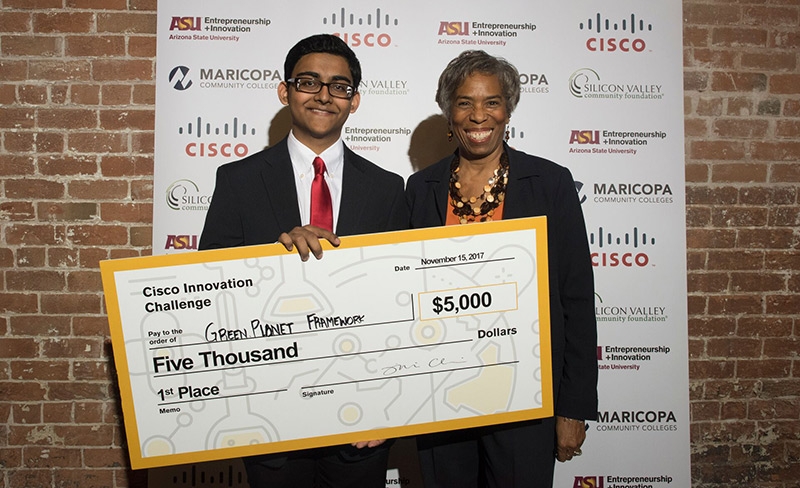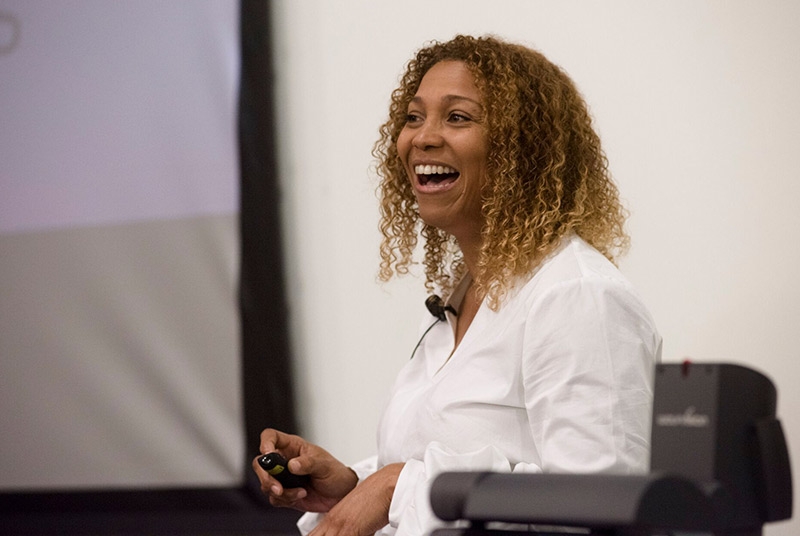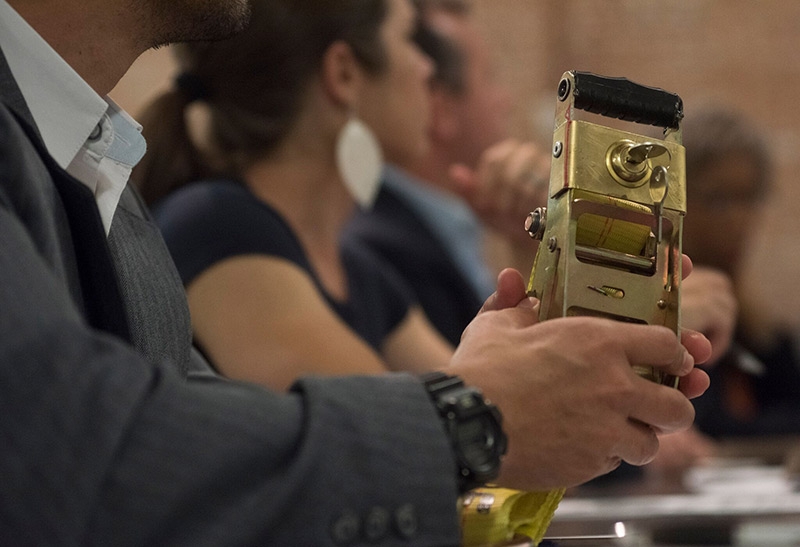Cisco Innovation Challenge helps students launch their ventures

Cisco Challenge winners from left to right: First-place winner, Joshua Pardhe for Green Planet/Aquifier Systems; second place winner, Cody Constanbader for Sure Strap; and third-place winner, Todd Hoffman for Ddot Technologies. Photo by Laura Segall
Everyone needs to do their part to conserve water. But what if entire communities could work together to eliminate the unnecessary waste of this valuable resource?
That’s the idea behind Green Planet Framework/Aquifier Systems, founded by Joshua Pardhe. The system allows users to compare the total volume of water delivered from a municipal source to the amount actually used in a home or other building. With this data, homeowners and property managers can identify water leaks and make critical repairs.
On Nov. 15, Pardhe was awarded first place at the Cisco Innovation Challenge and a prize of $5,000 to help launch his company. The Cisco Innovation Challenge is a live pitch competition where students can win seed funding to start, grow or launch their ventures. It is supported by grant funding from the Cisco corporate advised fund at Silicon Valley Community Foundation and hosted by Arizona State University’s Entrepreneurship and Innovation (E+I) in partnership with Maricopa Community Colleges.
Pardhe is currently completing high school and is dually-enrolled in his fifth semester at Glendale Community College. He’s an up-and-coming entrepreneur. And he’s just 15 years old.
“I was really excited to win!” Pardhe said. “With the immense problem of utility wastage that faces us today, we really need a large-scale solution to this problem. Did you know that Americans alone waste up to 1 trillion gallons of water a year?”
Next May, after graduating from high school, Pardhe plans to attend ASU with a double major in computer systems engineering and business administration. He will also continue his work with Green Planet/Aquifier Systems by completing additional research, obtaining necessary patents and creating prototypes for potential investors.
“The seed funding I received from the Cisco Innovation Challenge will help me to bring my community-based ecological change platform to market, allowing us to prevent wastage of our resources together and put them to use where they are most needed,” he said.
The Cisco Innovation Challenge is open to Maricopa Community College students from all majors and fields of study. The competition allows selected participants to pitch ideas for new internet of things solutions and technologies.
It can also be a culminating event for students in Poder, a five-week social entrepreneurship program offered at no cost to Maricopa Community College students by E+I who are selected to participate. Poder helps students develop a business concept and encourages them to consider how technology allows them to maximize their positive impact on the world.
“ASU is pleased and proud to partner with the Maricopa Community Colleges, Silicon Valley Community Foundation, and Cisco to present the Cisco Innovation Challenge to the community twice a year, and not only reward the student presenters, but also bring to life to a wider audience the importance of digitization and the power of entrepreneurship,” said Ji Mi Choi, associate vice president of ASU’s Office of Knowledge Enterprise Development. “As a university that values entrepreneurship, ASU’s Entrepreneurship and Innovation team endeavors to support students, faculty and the community in their development as entrepreneurs as well as the development of their ventures as drivers of economic and social change.”
The fall 2017 contestants presented companies in a diverse range of industries, including medical devices, sustainability solutions, enabling applications and consumer products. Second-place winner, Cody Constanbader from Paradise Valley Community College (PVCC) shared his idea for SureStrap, a locking tie-down strap that can prevent the theft of vehicles and valuable cargo.
In third place was Todd Hoffman, also from PVCC. He pitched Ddot Technologies, which provides accurate blood testing systems that patients can use from home, then download the results to their doctor’s offices.
Tracy Lea, the evening’s master of ceremony and assistant director of venture development at E+I, praised all the contestants for their innovative solutions and perseverance. She also provided sage advice to aspiring entrepreneurs.
“Keep on with your idea, even if you don’t succeed at first,” she said. “Failure can be the first step to where you want to go.”
The following finalists also presented at the Cisco Innovation Challenge:
Charlotte Hazzard, South Mountain Community College
Hushupbra/Ctear Management: A bra designed to alleviate skin irritation and relieve back pain
Anthem Pleasant, Glendale Community College
Postal Notice: A system to notify mobility-impaired users of mail delivery
Michael Renteria, Chandler Gilbert Community College
Knight Guard: A portable emergency and lifesaving system
Siavash Sabet, Paradise Valley Community College
Get-up: A device that reminds desk workers to stand and be active during the day
Hurshid Sadikov, Paradise Valley Community College
Sight Interactive Mobility Device (SIM): A multiple-solution portable device for people who are blind
Written by Susan Beauchamp
More Science and technology

Science meets play: ASU researcher makes developmental science hands-on for families
On a Friday morning at the Edna Vihel Arts Center in Tempe, toddlers dip paint brushes into bright colors, decorating paper…

ASU water polo player defends the goal — and our data
Marie Rudasics is the last line of defense.Six players advance across the pool with a single objective in mind: making sure that…

Diagnosing data corruption
You are in your doctor’s office for your annual physical and you notice the change. This year, your doctor no longer has your…




